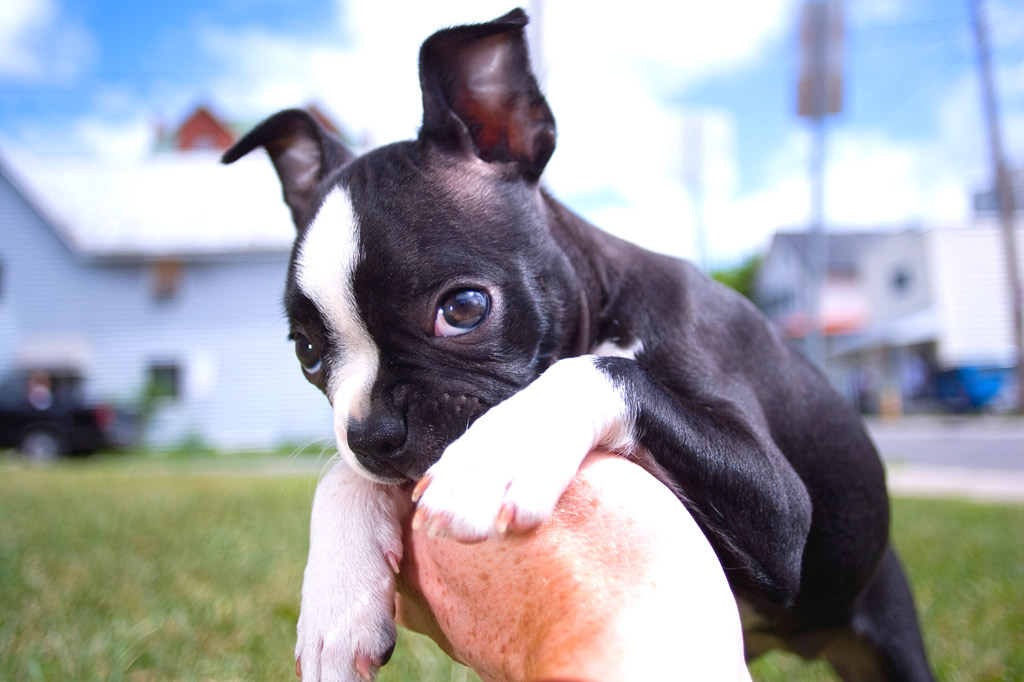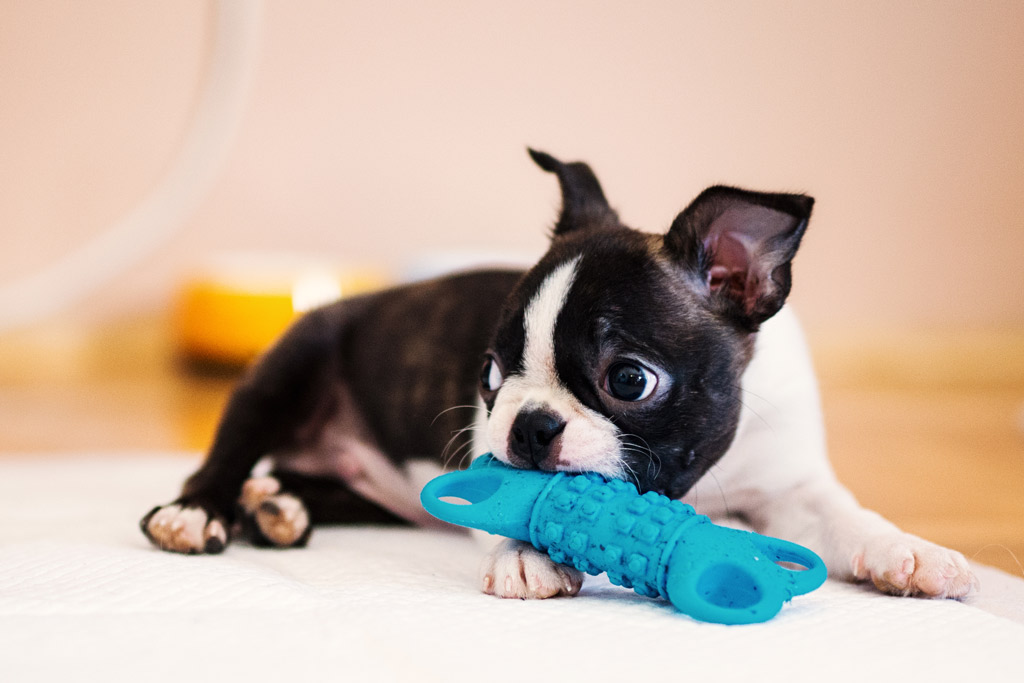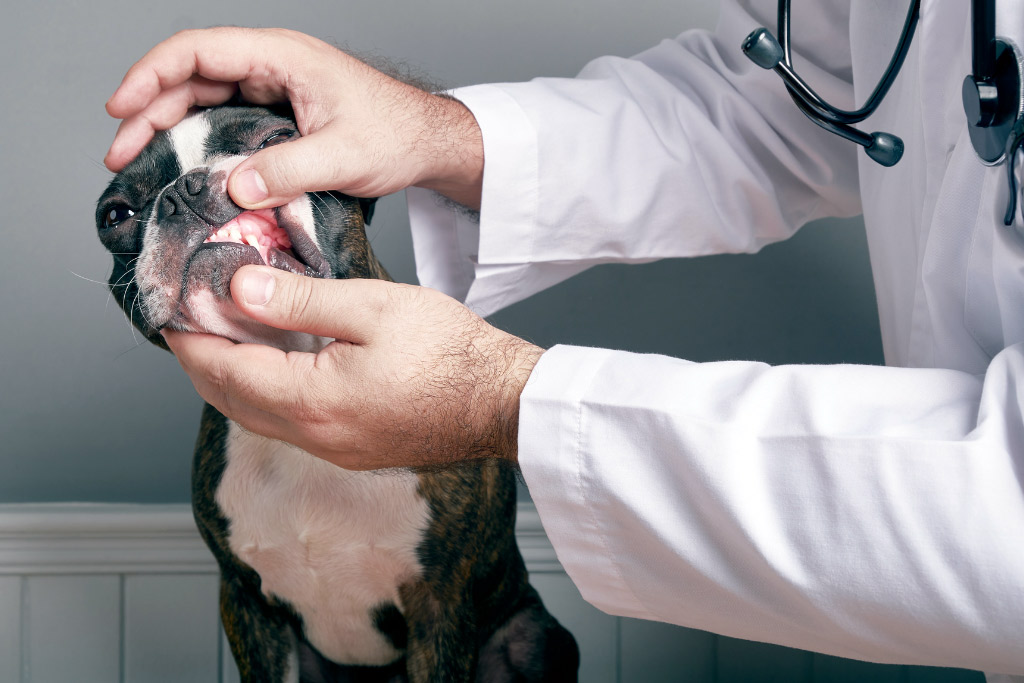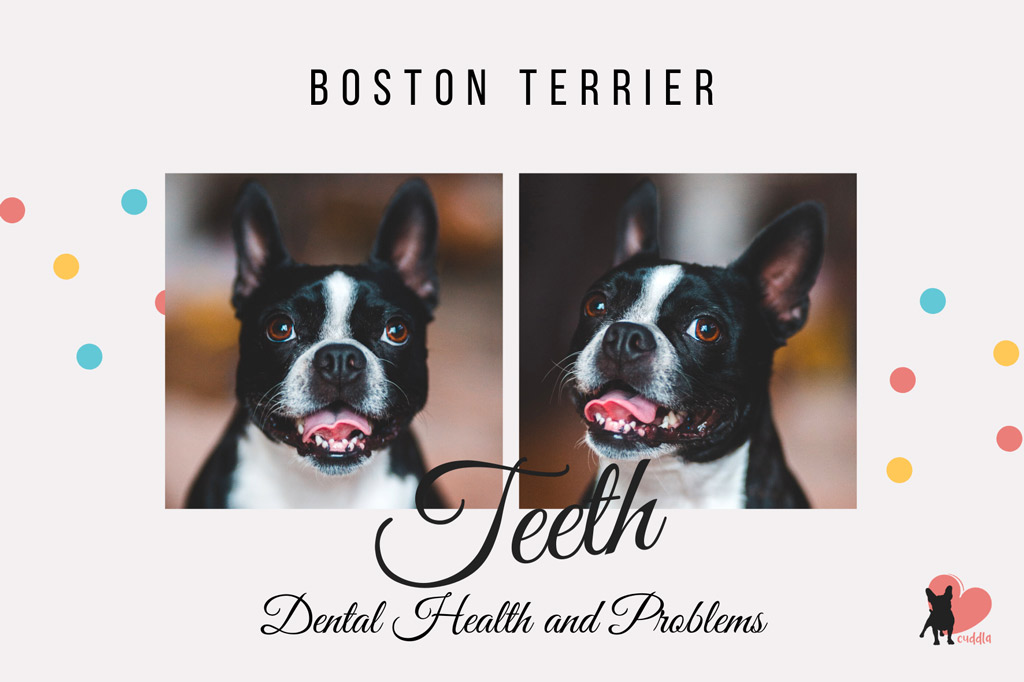
Pups, just like babies, go through teething. For Boston Terrier puppies, they start getting their milk teeth when they are 2 weeks old.
But, when do Boston Terriers stop teething? Boston Terriers stop teething when they get their permanent or adult teeth, which is usually between 6 to 8 months old.
Let’s dive into the Boston Terriers’ teething stages (and how long it lasts), and what you can do to help ease the pain during this process!
Boston Terrier Teething Stages
Did you know that…
“Puppies actually go through teething twice by the time they are a year old.”
Dr Debra M. Eldredge, DVM, in New York (source).
“Twice by the time they are a year old” – that’s something you’ll want to remember.
With that said, here are the Boston Terrier teething stages (source):
Weeks 2 to 4
During the neonatal stage (newborn to 2 weeks old) puppies are blind, deaf and toothless, i.e., newborn pups do not have teeth.
Their baby teeth will begin to appear when they are 2 to 4 weeks old (during the transitional stage).
By week 4, all of your Boston puppy’s baby teeth should have come out.
In total, puppies usually have about 28 baby teeth, also known as deciduous teeth or milk teeth.
For the first time when a Boston Terrier is teething, she will be with her mother and siblings at the breeder’s home.
Weeks 4 to 8
During the age of 4 to 6 weeks, the inhibited biting starts.
Inhibited biting means the puppy developing and learning how to control the strength of her bite, also sometimes referred to as soft mouth.
While puppies may start trying to sample the mom’s solid food as soon as their teeth start coming out, they don’t start eating solid food until week 4.
The breeder will start the process of weaning the puppies in the litter and they will be fully weaned off their mother’s milk when they are 8 weeks old.
Insider Tip: Weaning a puppy means introducing the foods that will become their adult diet, while gradually withdrawing from feeding mother’s milk. So, in short, this means the process of swapping from mother’s milk to “dog food”.
If your Boston Terrier puppy stayed with her mom and littermates until she’s 8-10 weeks old, she will usually have learned more appropriate social behaviour and bite inhibition.
Weeks 8 to 16
At about 8 weeks of age, your Boston Terrier pup will start to lose her puppy teeth.
“At about 8 weeks of age, your pup will start to lose his deciduous teeth. The roots resorb and the new adult teeth will push their way up through the gums.”
Dr Debra M. Eldredge, DVM, in New York (source).
During this stage, you will find rice-sized teeth around your house as your pup starts to shed her milk teeth.
This period is also important for socialization – i.e., exposing your Boston to new experiences to avoid stressful responses and anxiety to develop.
This phase plays a big role in bite inhibition and decreasing mouthiness. It’s a good time to start gradually touching your puppy’s mouth, outside and in. By doing this, your puppy will assimilate your behaviour as normal.
This will allow you to introduce your pup to a toothbrush and toothpaste next. Hopefully, she will enjoy it or at least tolerate it when it comes to brushing her teeth.
3 – 8 Months
At 3 months of age, your puppy loses her first set of teeth.
The process usually starts with the incisors. When Bostons are 3 months old, the deciduous (temporary) incisors begin to be replaced by permanent incisors (source).
This process is painful for your pup, so be patient and check the Boston Terrier Teething Solutions section below for some tips!
The molars come out next, around 4 months old.
When your Boston Terrier puppy is about six months old, all of her puppy teeth should have fallen out, and her adult teeth should have started to grow.
On average, by 6 to 8 months old, Boston Terriers develop 42 adult teeth. 10 more than us!
“Some breeds are prone to issues that can prolong the typical teething process. In some cases, the dog’s baby teeth are slow or resistant to falling out, sometimes even requiring intervention by a veterinarian.
Technically, those dogs haven’t fully gone through the whole teething process. That does tend to be somewhat breed dependent. We see it more in small breeds of dogs and brachycephalic breeds.“
Jennifer Coates, DVM, in Fort Collins, Colorado.
So, if you see that your Boston still has puppy teeth at this stage (especially around the 8 months mark), check with your veterinarian.
Read also: Boston Terrier Growth Stages and Puppy Development Chart to know what to expect on each of your pup’s growth stages!

Boston Terrier Teething FAQ
Here are some of the most asked questions about the Boston Terrier teething process:
You will almost certainly want to address your puppy’s nipping and chewing behaviour – no dog parent enjoys either! Here’s what you can do.

Boston Terrier Teething Solutions
There are two things that you should address whilst your Boston Terrier puppy is teething: the nipping behaviour and the chewing options.
Here are three tips to help your Boston Terrier puppy with teething:
#1 – Teach Your Boston Terrier to Stop Nipping
Between 3 to 6 months of age, adult teeth start coming out and your pup will begin chewing. Most puppies tend to be “mouthy” during the “Ranking Stage”.
This is the stage that concerns you. Now it’s your turn to teach your pup what the house rules are and that biting is not allowed.
The sooner you teach your Boston Terrier, the easier it is to guide your pup not to nip and bite during play and when excited. When she gets older and biting becomes harder, it becomes more difficult to stop it.
So it’s important that your Boston Terrier pup learns to inhibit her bite.
Read also: How to Stop Boston Terrier Nipping.

#2 – Provide a Chewing Outlet
For adult dogs, chewing keeps their jaws strong and their teeth clean. Plus, it also combats boredom and can relieve mild anxiety or frustration.
For Boston Terrier puppies, chewing is a way to relieve pain that might be caused by teething. So, a great way to prevent nipping is to provide chew toys like Kong Puppy Goodie Bone and Nylabone Puppy Chew.
Kong Puppy Rubber toys, for instance, are custom-designed for a growing puppy’s milk teeth. They can withstand teething punctures while reinforcing appropriate chewing behaviour.
Basically, they are made with tough but safe rubber that will keep your pup away from chewing anything else!
When choosing a toy, your Boston Terrier’s age is a key consideration:
- A three-week-old puppy: She still has her baby teeth. She needs toys with softer rubber or plush toys.
- From three to nine months: Your puppy will be teething, so avoid hard rubber. To help her cope with the pain and discomfort, have a good variety of chew toys that will keep her distracted from chewing everything else!
- Once the teething phase passes: Your dog will have a strong enough jaw for harder rubber toys, depending on her being an average or extreme chewer. Also, you can focus her endless energy by playing with balls or tug toys.
- By age seven or so: Your senior dog’s mouth strength will decrease. It’s time to give her softer toys to chew. Also, encourage her to stay active by playing with other toys that she might like.
P.S. Use my favourite dog toys guide for toys and game ideas to enjoy with your Boston Terrier!

#3 – Make Frozen Treats for Sore Gums
Cold and frozen toys and treats are another solution to sooth your Boston terrier puppy’s gums.
You can freeze a stuffed Kong for puppies or give your Boston Terrier a Nylabone Chill & Chew Freezer Dog Bone.
Also, you can offer your pup a frozen treat like blueberries or carrots for her sore gums.
If your Boston enjoys ice cubes, you can put a handful in a bowl and let her have at it!
Read also: 10 Boston Terrier Treats That Are Species-Appropriate – for more ideas!

Boston Terrier Teeth Problems
According to the American Veterinary Dental Society, over 80% of dogs have some kind of dental issue by age 3. As a result, these dogs will very likely have some early evidence of periodontal disease.
It starts with plaque that hardens into tartar and progresses to infection of the gums and roots of the teeth.
If left untreated, your Boston Terrier can lose her teeth and be in danger of damaging her kidneys, liver, and heart muscles.
This is where pet insurance becomes important for ensuring your Boston Terriers’ health at all times. My recommendation is Petplan pet insurance, who cover a wide range of veterinary treatments for dogs, including dental treatments.

Apart from periodontal disease, Boston Terriers can suffer from other dental problems including:
- Gum disease.
- Halitosis (bad breath).
- Gingivitis.
- Tooth fractures.
So, what are the warning signs to look out for?
- Bad breath.
- Excessive drooling.
- Swollen or bleeding gums.
- Loose or missing teeth.
- Excessive tartar build-up (you are not able to clean it).
If you notice any of these symptoms, pay a visit to your vet.
Insider Tip: Brushing your Boston Terrier’s teeth is probably the most effective way to prevent dental disease, bad breath, and tooth decay.
Read also: How to Brush Boston Terrier Teeth – which helps prevent dental diseases.

